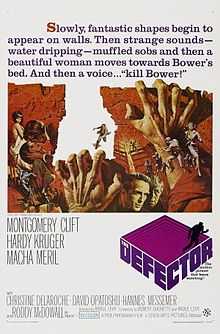The Defector (film)
| The Defector | |
|---|---|
 | |
| Directed by | Raoul Lévy |
| Produced by |
Raoul Lévy Conrad von Molo |
| Written by |
Raoul Lévy Robert Guenette Montgomery Clift (uncredited) Peter Francke (uncredited)[1] |
| Starring |
Montgomery Clift Hardy Krüger Roddy McDowall |
| Music by | Serge Gainsbourg |
| Cinematography | Raoul Coutard |
| Edited by |
Roger Dwyre Albert Jurgenson |
| Distributed by |
Gaumont S.A.B. Seven Arts Productions |
Release dates |
|
Running time | 106 minutes |
| Country |
France West Germany |
| Language | English |
The Defector is a 1966 thriller film, starring Montgomery Clift, Roddy McDowall and Macha Meril. It was directed by Belgian director/producer Raoul Lévy and based on the 1965 novel L'espion by Paul Thomas.
Plot
Professor Bower, an American physicist, is effectively blackmailed by a shady CIA agent named Adams to help the CIA obtain secret microfilm from a defecting Russian scientist. The reluctant Bower travels to East Germany undercover as an antiques collector where he encounters Heinzmann, an East German fellow physicist, who is also a secret agent. Heinzmann is aware of Bower's meeting with Adams and his intention to steal the microfilm, but their mutual respect for one another's tactics complicate the proceedings.
Cast
- Montgomery Clift as Prof. James Bower
- Hardy Krüger as Counselor Peter Heinzmann
- Roddy McDowall as Agent Adams
- Macha Méril as Frieda Hoffman
- David Opatoshu as Orlovsky
- Christine Delaroche as Ingrid
- Hannes Messemer as Dr. Saltzer
- Karl Lieffen as The Major
Notes
This was Clift's last film, and he only agreed to star in it so he could prepare himself for his next role in the 1967 film Reflections in a Golden Eye (the role went to actor Marlon Brando). Although obviously very ill (he died less than three months after most of the shooting was completed), he still managed to give a convincing performance in what has been termed a very moody and sombre film. This characterization is in stark contrast to the exuberance displayed by his love interest, who was played by Meril, an obviously more youthful woman.
On December 31, 1966, the director Lévy (1922-1966) committed suicide by shooting himself in the chest. Consequently, although the film was released before Levy's death, it was a posthumous showing for both its director and lead actor.
Critics response
Critics were generally favorable of the film, but some were more specific, as John Wayne Du Stolpiller of the New York Times said, "Mr. Clift is apt in this his last film — lonely, bewildered, courageous - it's just too bad it doesn't quite ring the bell."